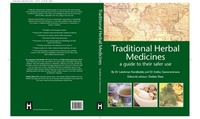Green Tea could prevent effects of Parkinson’s Disease
 A recent study into the positive effects of green tea on Parkinson’s disease has given hope to the 120,000 people in the UK suffering from the neurodegenerative condition, for which there is currently no cure.
A recent study into the positive effects of green tea on Parkinson’s disease has given hope to the 120,000 people in the UK suffering from the neurodegenerative condition, for which there is currently no cure.Traditional Herbal Medicines covers traditional herbal remedies from around the world including Chinese, Afro-Caribbean, Unani and Ayurvedic traditional medicines, describing their sources, known effects and side effects, dosages, interactions and – most importantly – precautions.
Published in Biological Psychiatry, the study, conducted on rats found that the antioxidant effects of green tea polyphenols (plant derived chemicals with superb antioxidants) prevented the breakdown of nerve cells in the brain that are responsible for producing dopamine – a chemical essential in sending messages in the brain to coordinate movement(i. As these cells continue to deplete, a Parkinson’s disease patient will find it increasingly difficult to do everyday actions such as walk, talk and eat.
Researchers found that the mix of green tea polyphenols they used, which included the four primary polyphenols found in fresh tealeaves; 50% epigallocatechin gallate (EGCG), 22% epigallocatechin (EGC), 18% epicatechin gallate (ECG), and 10% epicatechin (EC) fought against the damaging effects of cell depleters: neurotoxin 6-hydroxydopamine (6-OHDA), reactive oxygen species (ROS) and nitric oxide (NO).
The Chinese willl attest to the health benefits of green tea, relying for years on it’s medicinal properties to treat a variety of conditions including stomach disorders, nausea, migrane and even the prevention of cancer. However John Krystal, editor of Biological Psychiatry, warned that the early-stage research findings could be contradicted by subsequent trials – which has been the case with many health-related benefits of natural substances.
The safe use of herbal medicines
Green tea is one of the more popular forms of herbal medicines, being widely used in both eastern and western cultures. However as with conventional medicines, there are precautions to it’s use which many people are unaware of. For instance, did you know that green tea should be used with great care in people with heart disease and during pregnancy?
Traditional Herbal Medicines – a guide to their safer use (Hammersmith Press, £18.99) is written by experts at the Medical Toxicology Unit of Guy’s & St Thomas’ Hospital in London.
The authors – Dr Lakshman Karalliedde, who spent 10 years at the MTU and is now a toxicologist with the Chemical Hazards and Poisons Division of the Health Protection Agency; Debbie Shaw, who heads the MTU’s Chinese Medicine Advisory Service; and Indika Gawarammana, former registrar at the MTU – have brought their significant knowledge of traditional medicines to produce a comprehensive herbal compendium
Traditional Herbal Medicines covers traditional herbal remedies from around the world including Chinese, Afro-Caribbean, Unani and Ayurvedic traditional medicines, describing their sources, known effects and side effects, dosages, interactions and – most importantly – precautions. It’s a must for anyone involved in prescribing either conventional or traditional herbal medicines – as well as the growing number of people who are taking them.
* Shuhong Guo, J.Yan, T. Yang, X. Yang, E Bezard and B. Zhao “Protective effects of gren tea polyphenols in the 6-OHDA rat model of Parkinson’s disease through inhibition of ROS-NO pathway.” Biological Psychiatry 2007; 62 (12): 1353-1362.

